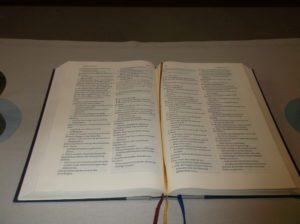I find it odd that one of the most controversial passages in the Bible is the one of the woman taken in adultery (John 8:1-11). Do you think that it’s odd that many versions of the Bible either omit or footnote this episode? Is it by chance that adultery and how it’s dealt with is surrounded by controversy?
I was reminded of this episode in responding to a reader’s comments.
Those passage footnotes focus on either questioning the inclusion of the verses in Holy canon or controlling the interpretation of it. Like a judge giving instructions to the jury guiding their choices, the footnotes steer the your thinking in a direction decided by editors.
I wonder why the editors want to tell me what to think rather than let my own mind and convictions guide me.
When you consider that over many centuries, men have dominated theological circles, it’s no wonder they seek control of the adultery questions in Scripture.
What is it about adultery that causes so much controversy? In theological circles, they even have a special name for this episode contained in the book of John. It’s called ‘pericope de adultera’.
Since I’m not a theologian, I’ll leave that angle of the story to those more experienced in that genre of knowledge.
As a therapist looking at the episode, my attention is drawn to the importance of ‘honesty’ in dealing with adultery. The woman and the crowd are forced to be honest about what happened. They’re also forced to consider the part they played in the incident. As a reader, I find myself relating to the uncomfortable honesty the crowd comes face to face wttih.
No one is calling the adultery a ‘mistake’, or a ‘one night stand’ or some other form of watering down. The crowd, the woman and Jesus each come face to face with honesty on the matter. There is no dancing around or avoidance. What happened was adultery, plain and simple.
Affairs have a way of forcing people to honestly face things. They may still lie in response to them. They have to face the reality that an affair happened. They also have to face the reality that something needs to change. They may also be like the adulterous man who is absent from the whole episode.
What gets changed often varies from situation to situation. It’s clear that the affair changes everyone it touches. No one stays the same after an affair.
The ‘pericope de adultera’ is a mirror where people and society has to honestly face adultery. The accusers didn’t like facing the honesty of the situation. Apparently the editors of some Bible translations, pastors, theologians and seminaries haven’t liked facing the honesty either. For them, it is easier to dismiss the story or gloss over it or water it down than to consider it. When you consider it, you have to face adultery with honesty.
You have to honestly consider the question of “What do you do with adultery?” That question is one that you may want to avoid. Even though you’d rather not face it, eventually you’ll have to. The question forces self-examination. You have to consider what part you played in the adultery as well.
Sure it’s easy wanting to condemn one of the cheaters. For some reason, the woman gets all the attention in the pericope de adultera (the woman taken in adultery). I often wonder “where’s the man?” Perhaps he escaped, perhaps he is in hiding, or maybe even one of those in the crowd. His absence is also telling. He’s the major part of the story that you don’t see.
He also has to honestly deal with his role in the whole episode. Did he set it up. Is he an exhibitionist who wants others to see what he’s done? Perhaps he’s using the woman for some other agenda. We don’t know.
That is one of the challenges of stories like the ‘woman taken in adultery’. They force you to consider uncomfortable truths about adultery. One of the truths is that you may never get the full story.














